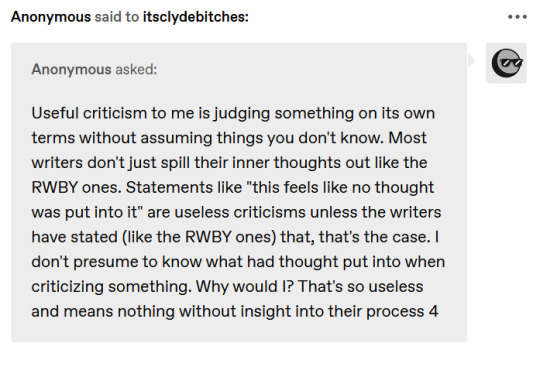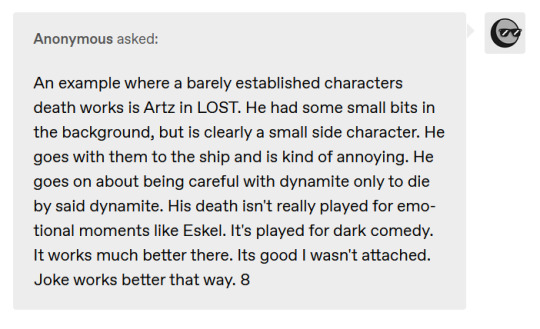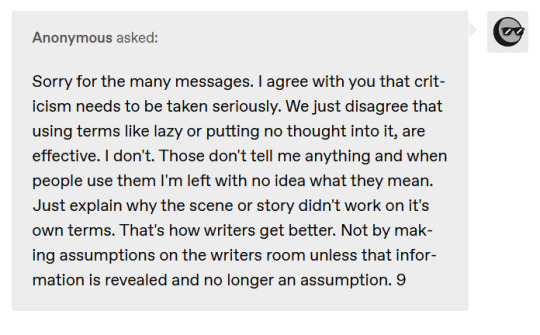#yes we are completely meaningless and yes we have garlic bread
Note
Sorry for the anon spam your about to get lol. I have thoughts. I think we are using different definitions of lazy. You're defining it as doing subpar work, but mine is more practical. I literally mean opening up Celtx and literally typing the words to a script is a act that can't be lazy by definition. Work was done. Quality of that work is irrelevant. Doing work inherently means someone was not being lazy. Even if the job wasn't done right. idk why you think I meant that? 1








Oh no worries, I’m very used to long message chains lol.
Yeah, it definitely seems like we’re working from different definitions because for me, laziness is not contained solely to the start of the project. I think laziness can impact things other than a) not starting the work at all or b) completely failing to finish the work. So to use your food example, let’s say you ordered a plate of spaghetti and it comes out with the pasta under-cooked. The sauce is stone cold. You’re missing the meatballs you asked for and the garlic bread is burned to a crisp. The manager is horrified by this and calls the cook out to explain themselves. Did something happen that distracted you from cooking the meal? Was there some emergency in the kitchen? Did anything quantifiable happen that we can point to and fix to ensure this doesn't happen again? No, the cook says, I just didn’t feel like putting any more effort into the meal. Cooking the pasta took too long, re-heating the sauce is a pain, the meatballs are in a totally different part of the kitchen that I couldn’t be bothered to go to, and keeping an eye on the garlic bread while doing everything else is just hard. Cooking is hard.
Now based on what you’ve said here, it sounds like you believe the cook can’t be lazy because they chose to cook in the first place and succeeded in technically producing some kind of meal. For me, the lack of quality—the lack of effort—would be a result of laziness. Laziness can impact work at any point during the process and it can cause effects other than failing to complete the process completely. And “laziness” means something different in each situation, which is why I emphasized professionalism before. No, someone who made an attempt at cooking spaghetti and got bored halfway through is not lazy. Someone who can’t be bothered to put in the expected amount of effort based on their professional responsibilities is someone we might term “lazy.” They no longer get kudos for doing anything at all, only for meeting a certain standard. For me, effort, quality, and laziness are all bound up together. “Work was done” is meaningless when we can define “work” as absolutely anything. I could be paid to write a novel, open up Word, write out “All work and no play makes Jack a dull boy” a couple hundred-thousand times, and then take the next eleven months off. Then when I try to pass that off as my novel, people have the right to call me lazy. I didn’t do the kind of work and the expected amount of work to earn the socially accepted marker of “working hard.” Without anything else impeding my efforts (mental health, finances, safety, etc.) it comes down to my unwillingness to do the job I was assigned to do at the standard that's expected of me. Failing that can be a kind of laziness. Yes, it’s different from the kind of laziness seen in someone who refuses to work at all, but it’s still being lazy. And honestly, I'd be shocked if anyone can honestly say they've never approached a project in a lazy manner. It's entirely possible to do something, but do it in a way where you know you're not putting your best foot forward.
As for criticism, why is pointing out that it feels like the author didn’t put enough thought into this less valid than pointing out, say, that it feels like the author didn’t put enough money into this part of the franchise? Or didn’t understand this character's personality? Or didn’t properly consider how to advertise their story to drum up the necessary audience? To be frank, the vast majority of criticism is coming from a place of assuming things we can't be 100% sure of because we simply weren’t there when those thousands of decisions were made. Every aspect of criticism is understood to be, on one level or another, subjective. So saying “This feels like the authors got lazy” isn’t presented as a factual statement, but rather as a way to express what’s not working well in the story. The story wanted to evoke a sense of immersion and emotional investment. What the story produced was a sense that the authors threw this together willy-nilly with little regard for that quality. Do you know what the thought process was for casting every single actor? Choosing every costume? Lighting techniques? Dialogue? Every aspect of a story that we could criticize comes with a lack of knowledge for why that choice was made and what limitations might have been impacting it, which puts everything on a fairly equal footing in regards to what we know. Especially when, in a case like RWBY, what's said in interviews is proven inaccurate, or comes across as being made up on the spot. Not even the authors straight up saying, "We did this because ___" or "We couldn't do this because ___" can't always be taken at face value. People lie, especially when they think that lie will maintain the audience that's paying them. So for me, saying, “This feels like the authors got lazy” is no more or less useful than, “This feels like the authors don’t understand how this trope works.” I don't know either thing as an absolute fact, but I'm hypothesizing what led to this problem in the first place.
You’ve laid out some of the reasons why Eskel’s death was badly done, but haven’t articulated why so many bad choices were made back to back to back. An interview saying very generally what they wanted overall—impactful witcher death—doesn’t explain how we got so many problems piled up together. These are professional writers handling a massive franchise, so of course people are going to wonder how they manage to mess things up not just this badly, but this frequently too given the other issues throughout the series. That’s where the concept of laziness comes in. If you were putting in the expected amount of work, surely we wouldn't have ended up with this many problems (and it's why "lazy" is tossed at series like RWBY that are really riddled through with issues, not just suffering from a bad arc or season). It’s arguably a whole lot easier to throw together a nonsense death scene than it is to figure out how to faithfully adapted a minor character and/or kill him off after establishing a bond with the audience, all in a way that pleases different fans of different parts of the franchise. The authors, seemingly, chose the less difficult option… which reads as lazy to me. Eskel doesn’t look like he should, has a completely different personality, engages in nonsensical events like randomly appearing with prostitutes, has only a single happy scene with Geralt to develop that bond (so, barely any development, really), made choices that don’t fit what little characterization we got (not telling anyone about the Leshen despite wanting Geralt’s help), was killed off after less than a single episode, the death itself was needless based on the rest of the fight (cutting the Leshen’s limbs), and this entire scenario breaks the lore in a way that few fans can see as benefiting the series. That’s a lot. So what caused this all these non-stop problems? I think you’ve hit on part of the cause, though not in a way you'd agree with: “They forgot this is an adaptation and can't rely on viewers having book or game knowledge to do the emotional heavy lifting with Eskel.” So they knew they had to include the “emotional heavy lifting” for us. They knew they had multiple audiences to think about. They knew this was a mix of fans who adored Eskel and fans who had no idea who he was. They knew this would be hard… and they didn’t put in the required amount of effort to produce a good product that catered to these expectations. It is, arguably, not even a decent product in regards to Eskel and some other, key changes. When your adaptation is that bad, failing on that many levels, it’s no longer just a matter of making mistakes. I don’t think you can just "forget" all those crucial aspects of a character and the story he belongs to. At a certain point, authors are choosing to take the easier route than the harder one that will result in a better product. Or, there’s an aspect of laziness to their work. It's not the end all and be all of the cause, but it's likely one aspect.
But yeah, that’s just something we clearly don’t agree on. For me, engaging with concepts of laziness is one way for authors to get better because I simply don’t believe that every bad choice stems from ignorance or an outside limitation. Sometimes it’s a matter of, “You already know what you have to do, you already know how to achieve it… but achieving it requires a level of effort you’re not yet willing to put forth.” Some authors don’t need to be taught how to write an emotionally compelling death, they need to be put into a situation where they’re willing and motivated to do the hard work to get there. I know how to write various kinds of pieces. I no longer need someone to teach me how to do that. If I fail to get the work done, it’s (usually) because I was giving into a certain amount of laziness and just not doing the work. I don’t need someone to sit me down and explain how to construct a paragraph, or how to come up with a thesis. I need someone to give me a well-meaning kick in the ass of, “Put in the work, Clyde. Stop being lazy and get the job done to the expected standard.”
17 notes
·
View notes